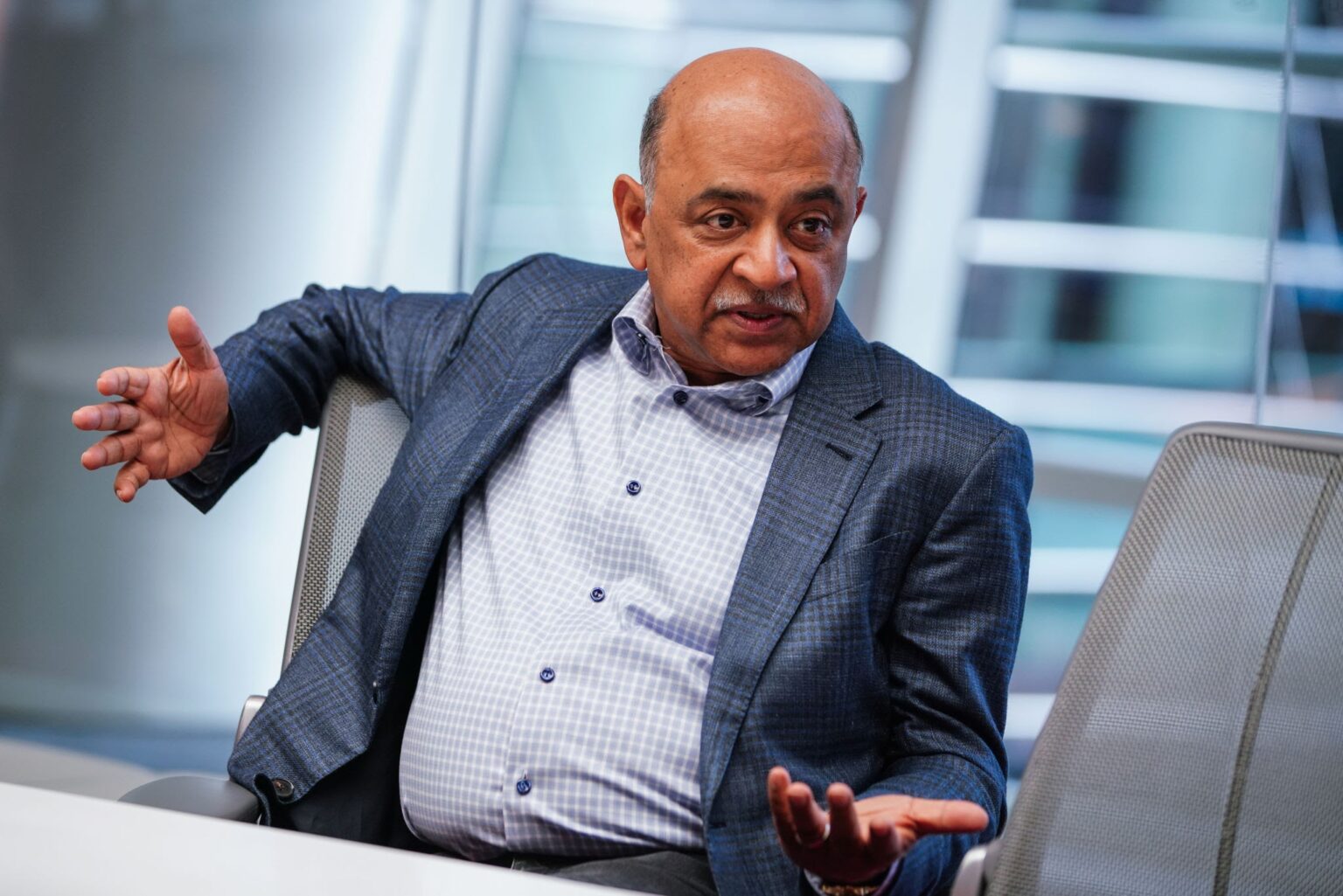In the pantheon of Indian-origin CEOs who now guide the world’s most powerful companies, Arvind Krishna’s name commands a unique kind of respect. He didn’t become a household celebrity overnight, nor did he arrive in Silicon Valley with an IPO-ready startup. Instead, his story is one of persistence, deep intellect, and steady leadership.
Born in a modest town in West-Central India into a civil-services family, and carrying his ancestral roots in Kerala, Arvind grew up with the structure and discipline of middle-class India: limited luxuries, a culture of service, and an unshakable emphasis on education. Decades later, he would rise through the ranks of IBM — not just to lead one of America’s grandest legacy tech firms but to redefine its very DNA around cloud and artificial intelligence (AI).
This is the story of a quiet visionary who turned a career in research into one of the most powerful CEO positions in global technology.
A Childhood of Discipline and Restraint
Arvind’s father was a senior civil servant, a career that symbolized stability and discipline in post-independence India. His family’s life was comfortable but far from extravagant. His mother was equally instrumental in nurturing his curiosity, constantly reminding him that education was the one investment that no financial hardship could take away.
Growing up in a small town meant he didn’t have access to the best laboratories or the latest gadgets. Textbooks were shared. Libraries carried dated volumes. Teachers juggled crowded classrooms. Yet these constraints bred in him the habits that would later define his leadership style: focus, self-discipline, and resilience.
As he would later remark in interviews, “When you grow up in places where resources are limited, you learn to innovate, to stretch every bit of opportunity you can get.”
The IIT Kanpur Crucible
For middle-class Indian families in the 1970s, the Indian Institutes of Technology (IITs) represented the ultimate dream. To secure a seat meant not only mastering one of the world’s toughest entrance exams but also securing a pathway to global opportunity.
Arvind earned admission to IIT Kanpur, one of the most prestigious of the IITs. There, he studied electrical engineering — a field that was both rigorous and forward-looking, preparing him for a world increasingly shaped by circuits, logic, and computing.
Life at IIT Kanpur was intense. The academic rigor was relentless, the competition fierce. But for Arvind, this was a crucible that sharpened not just his intellect but his sense of camaraderie and collaboration. It was here that he developed the traits that would later make him an exceptional leader: the ability to navigate complexity, to learn continuously, and to trust in the power of ideas.
Crossing Oceans: The American Dream
After IIT, Arvind pursued graduate studies in the United States — a bold leap for a small-town boy who had never traveled so far from home. He enrolled at the University of Illinois at Urbana-Champaign (UIUC) for his Ph.D. in electrical and computer engineering (some earlier accounts also reference University of North Carolina affiliations in his research collaborations).
The cultural shift was profound. Winters in Illinois were unforgiving for someone raised in tropical India. Money was tight. And the academic bar was set high. But Arvind thrived. His doctoral work focused on high-bandwidth communication systems, a subject that would prove foundational to the digital world that followed.
The immigrant grind — surviving on stipends, balancing research with teaching assistant duties, and staying connected to family back home through sparse phone calls — became part of his character. It instilled in him a quiet resilience that he would carry into every stage of his career.
IBM: The Beginning of a Defining Journey
In 1990, Arvind Krishna joined IBM as a researcher at the Thomas J. Watson Research Center. IBM was then a titan of technology, known for its mainframes and innovations in hardware. For Arvind, joining IBM wasn’t just a job — it was an opportunity to apply his research skills to problems of global consequence.
At IBM Research, he immersed himself in areas like wireless networking, security, databases, and cloud computing. His ability to bridge deep technical expertise with a strategic vision for the future distinguished him quickly from peers. Over the years, he would author patents, publish extensively, and build a reputation as a technologist who could see around corners.
IBM was going through tectonic shifts. Competitors were redefining markets, and the company needed leaders who could imagine new horizons. Arvind became one of those leaders.
Rising Through the Ranks: The Cloud and AI Champion
Arvind’s ascent within IBM was steady but relentless. He took on leadership roles across research, development, and strategy. What made him stand out was not just his technical brilliance but his ability to translate complex innovations into scalable business opportunities.
He was instrumental in IBM’s early bets on cloud computing and artificial intelligence. At a time when competitors like Amazon and Microsoft were racing ahead in cloud services, Arvind championed a hybrid cloud model — one that leveraged IBM’s legacy strengths in enterprise systems while embracing the flexibility of cloud.
Similarly, he became a vocal advocate for AI, not just as a buzzword but as a transformative technology with practical applications in industries from healthcare to finance. He led IBM’s acquisition of Red Hat in 2019 for $34 billion, the largest acquisition in IBM’s history. That bold move was intended to position IBM as a serious player in hybrid cloud, and it became a cornerstone of the company’s modern strategy.
Becoming CEO: A Legacy Company at a Crossroads
In April 2020, amid the global upheaval of the COVID-19 pandemic, Arvind Krishna was appointed CEO of IBM. It was a daunting inheritance. IBM was over a century old, a legend in American business, but it was struggling to keep pace with younger, more agile competitors in cloud and AI.
Taking charge at such a moment required both courage and clarity. Arvind brought both. He doubled down on hybrid cloud and AI as IBM’s north star, articulating a vision where IBM would no longer chase every market trend but instead focus on what it could uniquely do best.
He also initiated structural changes, spinning off parts of the business that no longer fit the strategy, while investing heavily in AI platforms like Watson and quantum computing research. His message was clear: IBM would honor its legacy, but its future would be built on reinvention.
Leadership Style: Thoughtful, Measured, Inclusive
Unlike some CEOs who dominate headlines with bold declarations, Arvind Krishna is known for his thoughtful, measured approach. Colleagues describe him as intensely analytical, deeply prepared, and always willing to listen.
He is also a leader who believes in inclusivity. As one of only a handful of Indian-origin CEOs in the Fortune 500, he has spoken about the importance of diversity in leadership. He mentors young professionals and actively champions programs that expand opportunities for underrepresented groups in technology.
For Arvind, leadership is not about charisma alone — it is about clarity of vision and the patience to see it through.
Recognition and Influence
Under his leadership, IBM has regained credibility as a serious contender in hybrid cloud and AI. Analysts point to the Red Hat integration and IBM’s renewed focus on enterprise clients as evidence of his steady hand.
Arvind has been featured in Fortune’s “Most Powerful People in Business” lists and is widely regarded as one of the most influential technologists-turned-CEOs in the world. But he remains understated, preferring to let IBM’s work — rather than his personality — capture the spotlight.
Lessons from Arvind Krishna’s Journey
Arvind’s rise from a modest upbringing in India to the CEO chair at IBM carries lessons that resonate with NRIs and aspiring leaders everywhere:
- Constraints breed creativity. His small-town upbringing taught him to innovate within limits.
- Technical depth matters. Unlike CEOs who arrive through marketing or finance, his Ph.D. and research background gave him credibility in steering IBM’s tech-heavy strategy.
- Patience wins. He rose through IBM not in a flash but over three decades, proving that consistency builds trust.
- Reinvention is survival. His insistence on cloud and AI reflects a belief that no company — however historic — can coast on legacy.
A Legacy Still in Motion
As of 2024, IBM under Arvind Krishna continues to evolve. The company is betting big on quantum computing, advancing AI ethics, and cementing its position in hybrid cloud. For Arvind, the mission is clear: to ensure IBM remains not just a relic of American corporate history but a relevant, thriving leader in the 21st-century digital economy.
From small-town India to the pinnacle of global technology leadership, Arvind Krishna’s story embodies the promise of persistence, intellect, and vision. He is proof that in today’s interconnected world, the boy who once studied under dim lights in India can one day steer a century-old giant through the stormy waters of technological change.
And in doing so, he stands as a beacon for NRIs everywhere: a reminder that humility and ambition, discipline and imagination, can together chart a path from modest beginnings to global influence.





